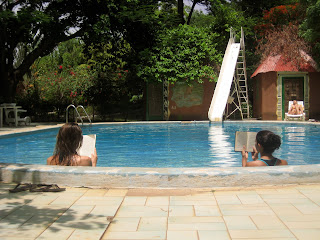Esther and Cassie came out to my village and helped me make this video; enjoy!*
One of the mini-projects I've worked on as a Peace Corps volunteer in Mali is the cultivation of the Moringa tree. I've planted about 10-15 in my yard and then walk around village giving seeds to folks who are interested (and able to plant them where goats won't eat them). Dramane, one of the more successful farmers in my village, planted about 30 of them last year in his garden and they've taken incredibly to the dry, sandy soil. Some additional uses of the tree include live fencing, wind breaks in fields and fodder for livestock.
Moringa can do so much! In order to avoid plagiarism, I'll direct you to a great site where you can learn even more about the incredible properties of the Moringa tree:
Moringa.com
Dramane, one of the farmers in my village, planted these moringa trees in April 2009 from seed! This photo was taken in June 2010.
Here Batuma is sifting the dried, pounded Moringa leaves
*Since I'm home in America for the next month I have the luxury of speedy uploads and so will be putting up some videos that would take too long to download in Mali.










